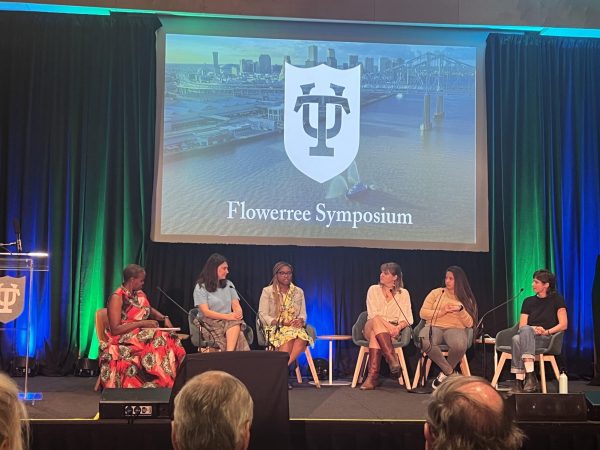
Tuesday, Oct. 8, marked the inaugural Flowerree Symposium at Tulane University, a nearly 12-hour-long event including presentations, screenings, discussions and speeches from climate change experts and stakeholders.
The symposium was funded by David and Jane Flowerree, who also fund the positions of two professors who organized the event: Sönke Dangendorf and Joshua Basseches.
“The Flowerree Symposium was an effort to bring together the School of Science and Engineering and the School of Liberal Arts at Tulane in order to address climate change,” Basseches said.
After an opening statement from President Michael Fitts, Hridesh Rajan, dean of the School of Science and Engineering and Brian Edwards, dean of the School of Liberal Arts, the symposium kicked off into the physical science portion of the day. The discussions focused on how the Louisiana Gulf Coast is particularly vulnerable.
“As the morning presentation showed, there’s going to be impacts everywhere,” Basseches said, “but the impacts are the most immediate and most destructive here.”
Dangendorf discussed how the Gulf Coast is experiencing unique sea-level changes and the risks associated with increasing flooding.
Next, Rutgers University professor Robert Kopp spoke about the climate science on sea-level changes represented by the International Panel on Climate Change, a body of the United Nations.
The second half of the day focused on the policy implications for climate change adaptation and mitigation.
Yale Law professor Joshua Macey presented on public utility law and the clean energy transition. His talk addressed three main topics: the misalignment between the interests of utility companies and shareholders, the challenges of regulating public utilities and the corporate governance of utility companies.
“By capping the returns that utilities make, we transform the shareholders into fixed claims. They look like debts,” Macey said. “If a utility innovates beyond what the regulator authorizes, you and I, as its customers, are the ones who benefit; not the shareholders.”
Next, Public Service Commissioner Davante Lewis spoke. Lewis represents Louisiana’s Third District. He talked about energy poverty, the current regulatory system and impacts of the current system on Louisiana.
“I’m highly concerned with the level of energy poverty as it’s known, that is prevalent here in our state of Louisiana,” Lewis said. “Bills are climbing high in summer months and folks are right within a couple of miles of us making determinations: whether or not they pay for medicine or rent to pay their utility bills.”
The symposium concluded with a screening of “Hollow Tree,” a documentary directed by Kira Akerman. Akerman focuses on the journey of three young Louisiana girls — Tanielma Da Costa, Mekenzie Fanguy and Annabelle Pavy. The three girls become fast friends on their journey to learn about the science, history and future of the disappearing Louisiana coast.
After the screening, the three subjects, Akerman and producer Chachi Hause sat down with ecology and evolutionary biology professor Jelagat Cheruiyot to discuss their lives since the film’s release and massive success.
“If I could have anything,” Pavy said as she pondered the future of Louisiana, “Of course, I think we can all agree: more investment in clean energy.”
Akerman spoke about the purpose of ending the symposium with a film of three human stories, instead of another scientific or policy lecture.
“We can’t keep repeating the extractive patterns, oppressive patterns, that got us into the situation of global warming,” she said. “We need to shift how we relate to each other, to the earth, to the practice of science.”
The audience of the symposium included Tulane faculty, students, New Orleans community members, local stakeholders and members of the Army Corps of Engineers, according to Basseches.
“I wanted people to come away with the idea that this is an interdisciplinary problem,” Basseches said. “We need to know the science in order to then move toward policy, but the policy is also important, because knowing the science but having nobody listen to the science, doesn’t really do much either.”


